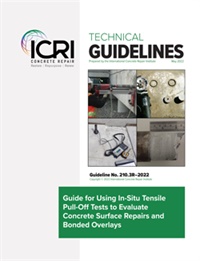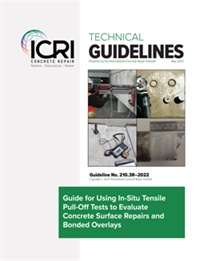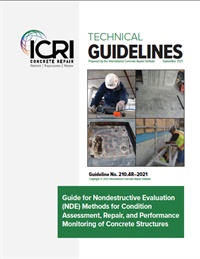
- Publication Date:
- Jan 01, 2016
- License:
- Short Description:
- This guideline is intended to assist the contractor, licensed design professional, and owner in the development of performance specifications for quality assurance and quality control of epoxy injection of concrete cracks. It includes process-control methods to assess if satisfactory injection work is being performed. Quality assurance methods described include visual observations and testing samples during the injection work, and removing concrete core samples and performing nondestructive testing of completed repairs.
- Price:
- $31.00 - $62.00

- License:
- Short Description:
- This guideline is intended to assist the contractor, licensed design professional, and owner in the development of performance specifications for quality assurance and quality control of epoxy injection of concrete cracks. It includes process-control methods to assess if satisfactory injection work is being performed. Quality assurance methods described include visual observations and testing samples during the injection work, and removing concrete core samples and performing nondestructive testing of completed repairs.
- Price:
- $0.00 - $62.00

- Publication Date:
- Jan 01, 2022
- License:
- Short Description:
- This guide provides a recommended method of evaluating the adequacy of concrete surface preparation and tensile bond strength of cementitious and polymer concrete surface repairs using the in-situ drilled core tensile pulloff test. The guide outlines equipment and material requirements, the test procedure, reporting, and acceptance criteria. This update also includes failure modes for concrete substrate tests.
- Price:
- $31.00 - $62.00

- License:
- Short Description:
- This guide provides a recommended method of evaluating the adequacy of concrete surface preparation and tensile bond strength of cementitious and polymer concrete surface repairs using the in-situ drilled core tensile pulloff test. The guide outlines equipment and material requirements, the test procedure, reporting, and acceptance criteria. This update also includes failure modes for concrete substrate tests.
- Price:
- $0.00 - $62.00

- Publication Date:
- Sep 01, 2021
- License:
- Short Description:
- This updated and revised guideline will assist contractors, NDE service providers, owners, design professionals, and material suppliers in the selection of nondestructive evaluation (NDE) methods for evaluating the condition of concrete structures. NDE methods can be very useful to perform a condition assessment prior to repairs and to provide quality control and assurance of repairs and long-term performance monitoring. Considerations in planning and executing an NDE program, including correlating with destructive methods, are discussed in the guideline. Guidance, including a brief synopsis of each method, is presented for selecting which NDE methods are appropriate for the concrete property/condition being assessed.
- Price:
- $31.00 - $62.00

- License:
- Short Description:
- This updated and revised guideline will assist contractors, NDE service providers, owners, design professionals, and material suppliers in the selection of nondestructive evaluation (NDE) methods for evaluating the condition of concrete structures. NDE methods can be very useful to perform a condition assessment prior to repairs and to provide quality control and assurance of repairs and long-term performance monitoring. Considerations in planning and executing an NDE program, including correlating with destructive methods, are discussed in the guideline. Guidance, including a brief synopsis of each method, is presented for selecting which NDE methods are appropriate for the concrete property/condition being assessed.
- Price:
- $0.00 - $62.00

- Publication Date:
- Jun 01, 2023
- License:
- Short Description:
- The intent of this document is to provide objective, standards-based comparison for the specification, evaluation, and approval of the degree of surface preparation of exposed conventional reinforcing steel by abrasive media blasting and mechanical hand tool methods. This guide is designed for use with associated illustrative materials available in digital or physical form through ICRI.
- Price:
- $31.00 - $62.00

- License:
- Short Description:
- The intent of this document is to provide objective, standards-based comparison for the specification, evaluation, and approval of the degree of surface preparation of exposed conventional reinforcing steel by abrasive media blasting and mechanical hand tool methods. This guide is designed for use with associated illustrative materials available in digital or physical form through ICRI.
- Price:
- $0.00 - $62.00

- Presenters:
- Fred Goodwin
- Duration:
- 1 hour
- Format:
- Audio and Video
- License:
- Short Description:
- This webinar will cover the basics of concrete, its composition, properties, and deterioration mechanisms.
- Price:
- $0.00 - $40.00

- Presenters:
- Peter Tarara | Chris White
- Duration:
- 1 hour
- Format:
- Audio and Video
- License:
- Short Description:
- This presentation will cover technical considerations, repair techniques, concrete repair basics and the selection and use of repair materials.
- Price:
- $0.00 - $40.00
Please wait ...